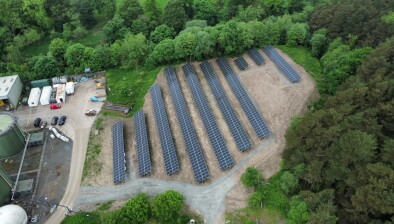Scottish Government to host emergency onshore wind summit

The Scottish Government is to convene an emergency summit to discuss the impact of the UK government’s decision to end onshore wind support.
Energy secretary, Amber Rudd MP, recently announced that new onshore wind farms will be excluded from an existing funding scheme from 1st April 2016, which is a year earlier than expected.
All projects that already had planning permission and other similar conditions could still get built under a proposed “grace period”.
It has since been estimated that the decision could potentially lead to a loss of up to as £3 billion in investment and endangers 5,400 jobs in Scotland.
Energy minister Fergus Ewing will meet with key players in the renewables sector in Glasgow early next month to hear the concerns of the industry which will inform in his ongoing discussions with the Ms Rudd and other devolved administrations.
Mr Ewing met with the Inverness Chamber of Commerce and the renewables industry to listen to their concerns about the impact on both developers and the supply chain.
The minsiter said: “The Scottish Government strongly disagrees with this decision which was made without our consent and will have such a negative impact on a key sector of the Scottish economy. The proposals have a disproportionate impact on Scotland as around 70 per cent of onshore wind projects in the UK planning system are here.
“There are many communities and companies who have invested significant amounts of money in renewables scheme and have now found the goal posts have been move, putting crucial investment and jobs at risk. I am keen to listen to their concerns, understand the impact and continue to work together in making representations to the UK Government.
“UK ministers also urgently need to clarify the position regarding onshore wind projects already in the pipeline, and how many of them can expect to continue to receive investment during the grace period before funding is cut off.
“The most recent energy figures show renewables continue to go from strength to strength, with almost half of Scotland’s electricity use coming from renewables last year and wind delivering record amounts of power in the first three months of 2015. Scotland accounts for around a third of total UK renewables generation. This makes the recent decision by the UK Government to end the RO next year even more regrettable.
“The Scottish Government remains committed to the renewable sector and to achieving our target of 100 per cent of our electricity demand through renewables by 2020 and the onshore wind sector is a significant part of that.”
Niall Stuart, chief executive of Scottish Renewables, said: “The recent announcement to close the Renewables Obligation to onshore wind has caused a huge amount of disquiet within the industry, and threatens significant levels of investment, employment and renewable power generation.
“This is a key issue for everyone with an interest in renewable energy development in Scotland and the summit will be an important opportunity for our members to put over their questions, comments and concerns to the Minister for Business, Energy and Tourism as we seek to find a way to ensure the sustainable growth of our onshore wind industry.”
Meanwhile across the UK, Barbour ABI data suggests that projects worth over £6.4bn will be put in jeopardy.
The construction intelligence provider said there are 338 proposed wind farms that are yet to receive planning permission, putting them at risk of incompletion.
Commenting on the figures, Michael Dall, lead economist at Barbour ABI, said: “There are 5,000 active wind turbines already in use across the UK, producing five per cent of the total amount of national electricity. The government has a target of 30 percent of UK electricity coming from renewables by 2020, and must believe that other areas of renewable energy should be prioritised over onshore wind projects to receive future subsidies and investment before the 2020 target year.
“In 2014, the government paid out £800 million in subsidies for onshore wind farm projects and must believe the country now has enough turbines for the short and long term future.”














